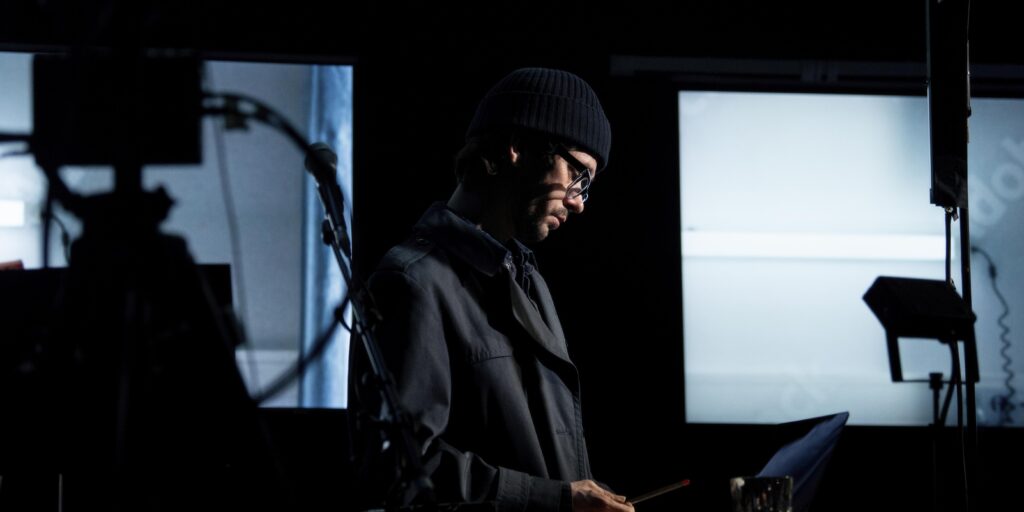
Bluets
Royal Court Theatre
until 29th June 2024
Director: Katie Mitchell
Adapted for stage by: Margaret Perry
Produced by Royal Court
Maggie Nelson’s book Bluets is described as a lyrical and philosophical meditation on suffering and love. The Royal Court’s production of Nelson’s acclaimed work, directed by Katie Mitchell, stars Emma D’Arcy, Kayla Meikle and Ben Whishaw, who guide the audience across one individual’s experience of depression, love, and the human condition, through their relationship to the colour blue.
The stage at the Royal Court has been transformed into a complex technological set up, with screens, projectors and cameras spilling out. Each actor has their own space at the front of the stage, with a camera, microphone, music stand and prop table, though all are identical. Behind the large projector screen, you could see through to the back of the stage where the actors were sitting, chatting and preparing; there was something beautiful in seeing the actors exist before the show, a reminder that they’re human but also a cinematic quality that was only the start of Mitchell’s creation.
The show begins as it means to go on; poetical passages, with strands of narrative, spoken by the three actors, sometimes taking one word each, sometimes lines, and fast-paced technological changes and techniques. Cinema truly is created before your very eyes, and praise must go to Ellie Thompson and Grant Gee (video designer and video director) who created vivid locations with only recorded videos on TV screens. Live audio/visuals are becoming more prominent in theatre, however I feel Bluets achieves something greater. A more intricate, unique and meaningful use of videography, set and theatrical creation.
Stage management were present throughout and there was something intimate about the way they effortlessly changed props, camera angles, costumes etc. They felt part of the piece, their presence accepted by the audience and with their efficiency, they became shadows appearing as quickly as they disappeared.
D’Arcy, Meikle and Whishaw act as one character, however each represent a different strand of the individual’s psyche – one obsessive, one depressive and one determined to distract, according to Perry. Whilst each brought a different meaning, understanding and emphasis to the work, I am not sure their identity as different strands was entirely clear in performance as it was perhaps in theory. What was truly impressive was the trio’s synchronicity; such detail, care and time was taken to ensure they created the correct image, movement and positioning not only for the camera but also for their own performances, as well as listening to one another and moving with the text as one.
Emma D’Arcy shone as ‘B’ (their characters were alphabetised); their engagement with the language was impeccable, each word heartfelt and packed with meaning. Kayla Meikle was also a wonder; calm, collected and truthful, you felt safe in her delivery of the text. Ben Whishaw’s comedic timing was brilliant, and he offered moments of light release amidst a relentless story, however, at times, it felt he was missing cues which altered the natural rhythm of speech, although perhaps this was the way Mitchell and Perry intended.
Not many actors could do this style of work. It requires complete concentration, dedicated understanding of language and a willingness to explore, which as a collective ensemble, I felt all three actors achieved.
Nelson writes, “That this blue exists makes my life a remarkable one, just to have seen it. To have seen such beautiful things.” The piece is built upon the colour blue, what it means to us, how we see it, and blue became so much more than just a colour last night. Whilst the narrative, at times, got lost in the poetical lyricism, the story is a universal one. The colour blue provided not only a metaphorical outlet of expression but also an appreciation of natural beauty and colour we take for granted. Bluets is not for everyone; a radical new form of theatre, it is unlike anything else out there. However, Bluets moved me in a way theatre never has before, challenging, engaging, moving and uniting the audience through the sheer power of language and cinematic experiment.
Bluets, directed by Katie Mitchell, adapted by Margaret Perry based on Maggie Nelson’s book, is playing at the Royal Court from the 17th May-29th June.
Reviewed by Lily Sitzia
Photograph: Camilla Greenwood